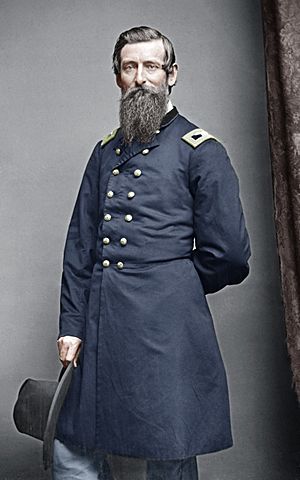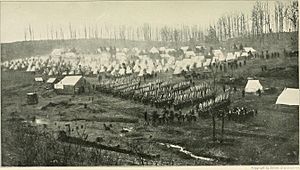Jacob Gellert Frick facts for kids
Quick facts for kids
Jacob Gellert Frick Sr.
|
|
|---|---|

Frick c. 1863
|
|
| Born | January 23, 1825 Northumberland County, Pennsylvania |
| Died | March 5, 1902 (aged 77) Pottsville, Pennsylvania |
| Buried |
Presbyterian Cemetery, Pottsville, Pennsylvania
|
| Allegiance | United States |
| Service/ |
United States Army (Union Army) |
| Years of service | 1846–1865 |
| Rank | Colonel |
| Unit | |
| Commands held | |
| Battles/wars | Mexican–American War American Civil War: |
| Awards | Medal of Honor |
Jacob Gellert Frick Sr. (born January 23, 1825 – died March 5, 1902) was a brave officer in the United States Army. He fought in the American Civil War for the Union Army. He was a leader in several regiments, including the 96th Pennsylvania Infantry and the 129th Pennsylvania Infantry.
Frick received the Medal of Honor, which is the highest award for bravery in the U.S. He earned it for his amazing courage during two big battles: Fredericksburg and Chancellorsville in Virginia.
At Fredericksburg on December 13, 1862, he grabbed the American flag from his unit's flag-bearer. This act inspired his soldiers to keep fighting "through a terrible fire of cannon and musketry." At Chancellorsville on May 3, 1863, he fought hand-to-hand to get his regiment's flag back after the enemy captured it. He was 67 years old when he received his Medal of Honor on June 7, 1892.
Pennsylvania Governor Andrew Gregg Curtin praised Frick, saying he was a "soldier" and a "worthy officer." He also noted Frick's "coolness and courage" in battle.
Contents
Early Life and Military Start
Jacob Frick was born in Northumberland County, Pennsylvania. His family had come from Switzerland several generations before.
In June 1846, when the Mexican–American War began, he became a Third Lieutenant in the 3rd Ohio Infantry Regiment. After that war ended, he joined the regular army in the 11th US Infantry Regiment. He also worked as an instructor at Fort McHenry. Frick was also involved in politics, attending the 1860 Republican National Convention.
He married Catharine (Schuyler) Frick (1827–1864) from Pottsville. They had several children together.
Fighting in the Civil War
Jacob G. Frick was one of the first people to join President Lincoln's call for volunteers. This happened after Fort Sumter fell to the Confederate States Army in April 1861. On September 23, 1861, at age 36, he joined the Civil War army in Pottsville, Pennsylvania. He officially became a part of the officer team for the 96th Pennsylvania Infantry.
As a lieutenant colonel, he was the second-in-command of his regiment. He fought with his unit in the Seven Days Battles from June 25 to July 1, 1862. These battles included Gaines's Mill (June 27), Glendale (June 30), and Malvern Hill (July 1).
On July 29, 1862, Frick left his unit to lead a new one, the 129th Pennsylvania Infantry. He became a colonel and rejoined the army at Camp Curtin in Harrisburg, Pennsylvania, on August 15. He and his soldiers then traveled to Washington, D.C.. They set up camp near Alexandria, Virginia, on August 18.
His unit was assigned to guard duties. Two groups of his soldiers were sent to build a bridge across Bull Run. The rest of his men were ordered to guard a Union ammunition train on August 30 near Centreville. There, they faced brief but heavy enemy artillery fire. His unit joined General E. B. Tyler's brigade on September 3. Frick continued to train his soldiers at their camps.
Battle of Fredericksburg
Frick and his men experienced their first major battle in December during the Battle of Fredericksburg. On December 13, his division crossed the Rappahannock River. They moved through the town to a spot where they could see the battlefield. They waited for orders to join the fight.
The enemy started firing heavily, wounding many Union soldiers. Frick's unit moved to the left and formed a battle line. They were on a hill, with the 129th on the left front. They made a difficult charge against the enemy's strong position. Despite constant gunfire and artillery, the officers and men fought bravely. They moved forward through lines of fallen soldiers. They pressed on in the growing darkness, reaching a point further than any previous charge.
In a short time, the regiment lost 142 men who were killed or wounded. Some of their caps were found very close to the enemy's stone wall. One officer and seven soldiers from Company D were captured.
After the battle, General Tyler praised Frick and his officers. He said they "discharged their respective duties creditably and satisfactorily." He noted that their voices were often heard "above the din of battle," urging their men forward. Frick's actions that day later helped him receive the Medal of Honor.
Mud March and Chancellorsville
After Fredericksburg, Frick and his men were assigned to guard duties. They then took part in the "Mud March" in January 1863. This was a difficult march led by Major-General Ambrose Burnside.
Frick and his 129th Pennsylvanians showed great courage during the Battle of Chancellorsville (May 1–3, 1863). In this battle, the 129th Pennsylvania again fought fiercely in hand-to-hand combat with the enemy. General Tyler again praised Frick's men. He said their work was "cooler" than any drill and their firing was "grand." Five members of the regiment died, 32 were wounded, and five were missing.
Frick and his men were honorably discharged on May 18, 1863. They returned home to Pennsylvania. Just like at Fredericksburg, Frick's actions at Chancellorsville were a key reason he received the U.S. Medal of Honor. He personally fought to get his regiment's flag back after it was taken by the enemy.
Gettysburg Campaign
After leaving the 96th Pennsylvania, Frick joined a third Pennsylvania unit. He rejoined the army at Camp Curtin in Harrisburg on June 22, 1863. On the same day, he became the colonel of the 27th Pennsylvania Militia. This was one of many short-term units quickly formed that summer. Their goal was to stop Confederate General Robert E. Lee's army from advancing into Pennsylvania.
As the commanding officer of this regiment, Frick led the 27th Pennsylvania Emergency Militia during the Gettysburg Campaign. One of his unit's successes was burning the Columbia-Wrightsville Bridge. This prevented Confederate infantry led by John B. Gordon from capturing it. Frick and his regiment were discharged on July 31, when the state decided the emergency was over.
The fourth year of the war was tough for Frick, especially at home. In February 1864, his wife passed away. Their newborn son, John C. Frick, lived only five months. Another of their children also passed away that year. During this time, Frick also advised Colonel Henry Pleasants. This was about placing mines under Confederate defenses during the 1864 Siege of Petersburg. This led to the Battle of the Crater.
Life After the War
After the war, Jacob Frick returned to Pottsville, Pennsylvania. In the 1880s, he worked as a deputy collector for the U.S. Internal Revenue Service.
He remarried Priscilla H. (McGinnes) Frick (1840–1891). They had children together: Mason Mitchell (1869–1901), Annie (born July 1870), Jacob Jr. (born July 1872), and Thomas Percy (1874–1874).
His second wife passed away in 1891. Jacob G. Frick, Sr. continued to live in Pottsville with his children Mason, Annie, and Jacob Jr. He passed away in Pottsville on March 5, 1902. He was buried in the Presbyterian Cemetery in Pottsville.
Images for kids
 | Lonnie Johnson |
 | Granville Woods |
 | Lewis Howard Latimer |
 | James West |



